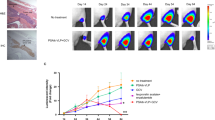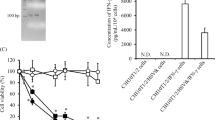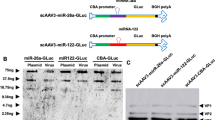Abstract
Pancreatic cancer (PC) remains a life-threatening disease. Efficient therapeutic gene delivery to PC-derived cells continues to present challenges. We used self-inactivated lentiviral vectors to transduce PC-derived cells in vitro and in vivo. We showed that lentiviral vectors transduce PC-derived cell lines with high efficiency (>90%), regardless of the differentiation state of the cell. Next, we transferred human interferon beta (hIFN-β) gene. Expression of hIFN-β in PC cells using lentiviral vectors resulted in the inhibition of cell proliferation and the induction of cell death by apoptosis. In vivo, lentiviral administration of hIFN-β prevented PC tumor progression for up to 15 days following gene therapy, and induced tumor regression/stabilization in 50% of the mice treated. Again, hIFN-β expression resulted in cancer cell proliferation inhibition and apoptosis induction. We provide evidence that human immunodeficiency virus (HIV)-1-based lentiviral vectors are very efficient for gene transfer in PC-derived cells in vitro and in vivo. As a consequence, delivery of hIFN-β stopped PC tumor progression. Thus, our approach could be applied to the 85% of PC patients with a locally advanced disease.
This is a preview of subscription content, access via your institution
Access options
Subscribe to this journal
Receive 12 print issues and online access
$259.00 per year
only $21.58 per issue
Buy this article
- Purchase on Springer Link
- Instant access to full article PDF
Prices may be subject to local taxes which are calculated during checkout





Similar content being viewed by others
References
Jemal A, Siegel R, Ward E, Murray T, Xu J, Thun MJ . Cancer statistics, 2007. CA Cancer J Clin 2007; 57: 43–66.
Delpero JR . Surgical resection of pancreatic adenocarcinoma: indications and contraindications, pronostic factors and survival, recent advances. Cancer Radiother 2004; 8 (Suppl 1): S73–S79.
Griffin JF, Smalley SR, Jewell W, Paradelo JC, Reymond RD, Hassanein RE et al. Patterns of failure after curative resection of pancreatic carcinoma. Cancer 1990; 66: 56–61.
Bhattacharyya M, Lemoine NR . Gene therapy developments for pancreatic cancer. Best Pract Res Clin Gastroenterol 2006; 20: 285–298.
Cordelier P, Buscail L . Gene therapy: a reality for tomorrow? Gastroenterol Clin Biol 2005; 29: 724–731.
Halloran CM, Ghaneh P, Costello E, Neoptolemos JP . Trials of gene therapy for pancreatic carcinoma. Curr Gastroenterol Rep 2005; 7: 165–169.
MacKenzie MJ . Molecular therapy in pancreatic adenocarcinoma. Lancet Oncol 2004; 5: 541–549.
Carrere N, Vernejoul F, Souque A, Asnacios A, Vaysse N, Pradayrol L et al. Characterization of the bystander effect of somatostatin receptor sst2 after in vivo gene transfer into human pancreatic cancer cells. Hum Gene Ther 2005; 16: 1175–1193.
Cordelier P, Bienvenu C, Lulka H, Marrache F, Bouisson M, Openheim A et al. Replication-deficient rSV40 mediate pancreatic gene transfer and long-term inhibition of tumor growth. Cancer Gene Ther 2007; 14: 19–29.
Vernejoul F, Faure P, Benali N, Calise D, Tiraby G, Pradayrol L et al. Antitumor effect of in vivo somatostatin receptor subtype 2 gene transfer in primary and metastatic pancreatic cancer models. Cancer Res 2002; 62: 6124–6131.
Vernejoul F, Ghenassia L, Souque A, Lulka H, Drocourt D, Cordelier P et al. Gene therapy based on gemcitabine chemosensitization suppresses pancreatic tumor growth. Mol Ther 2006; 14: 758–767.
Trono D . Lentiviral vectors: turning a deadly foe into a therapeutic agent. Gene Ther 2000; 7: 20–23.
Wiznerowicz M, Trono D . Harnessing HIV for therapy, basic research and biotechnology. Trends Biotechnol 2005; 23: 42–47.
Kay MA, Glorioso JC, Naldini L . Viral vectors for gene therapy: the art of turning infectious agents into vehicles of therapeutics. Nat Med 2001; 7: 33–40.
Saidi RF, Williams F, Ng J, Danquah G, Mittal VK, ReMine SG et al. Interferon receptors and the caspase cascade regulate the antitumor effects of interferons on human pancreatic cancer cell lines. Am J Surg 2006; 191: 358–363.
Saidi RF, Williams F, Silberberg B, Mittal VK, ReMine SG, Jacobs MJ . Expression of interferon receptors in pancreatic cancer: identification of a novel prognostic factor. Surgery 2006; 139: 743–748.
Vitale G, van Eijck CH, van Koetsveld Ing PM, Erdmann JI, Speel EJ, van der Wansem Ing K et al. Type I interferons in the treatment of pancreatic cancer: mechanisms of action and role of related receptors. Ann Surg Aug 2007; 246: 259–268.
John WJ, Flett MQ . Continuous venous infusion 5-fluorouracil and interferon-alpha in pancreatic carcinoma. Am J Clin Oncol 1998; 21: 147–150.
John WJ, Foon KA . Interferon use in solid tumors. Cancer Treat Res 1998; 94: 23–33.
Wagener DJ, Wils JA, Kok TC, Planting A, Couvreur ML, Baron B . Results of a randomised phase II study of cisplatin plus 5-fluorouracil versus cisplatin plus 5-fluorouracil with alpha-interferon in metastatic pancreatic cancer: an EORTC gastrointestinal tract cancer group trial. Eur J Cancer 2002; 38: 648–653.
Picozzi VJ, Kozarek RA, Traverso LW . Interferon-based adjuvant chemoradiation therapy after pancreaticoduodenectomy for pancreatic adenocarcinoma. Am J Surg 2003; 185: 476–480.
Torrisani J, Bouisson M, Puente E, Capellà G, Laurent-Puig P, Berger A et al. Transcription of SST2 somatostatin receptor gene in human pancreatic cancer cells is altered by single nucleotide promoter polymorphism. Gastroenterology 2001; 120: 200–209.
Sirven A, Pflumio F, Zennou V, Titeux M, Vainchenker W, Coulombel L et al. The human immunodeficiency virus type-1 central DNA flap is a crucial determinant for lentiviral vector nuclear import and gene transduction of human hematopoietic stem cells. Blood 2000; 96: 4103–4110.
Yam PY, Yee JK, Ito JI, Sniecinski I, Doroshow JH, Forman SJ et al. Comparison of amphotropic and pseudotyped VSV-G retroviral transduction in human CD34+ peripheral blood progenitor cells from adult donors with HIV-1 infection or cancer. Exp Hematol 1998; 26: 962–968.
Zufferey R, Dull T, Mandel RJ, Bukovsky A, Quiroz D, Naldini L et al. Self-inactivating lentivirus vector for safe and efficient in vivo gene delivery. J Virol 1998; 72: 9873–9880.
Brule F, Khatissian E, Benani A, Bodeux A, Montagnier L, Piette J et al. Inhibition of HIV replication: a powerful antiviral strategy by IFN-[beta] gene delivery in CD4+ cells. Biochem Pharmacol 2007; 74: 898–910.
Ravet E, Reynaud D, Titeux M, Izac B, Fichelson S, Roméo PH et al. Characterization of DNA-binding-dependent and -independent functions of SCL/TAL1 during human erythropoiesis. Blood 2004; 103: 3326–3335.
Sipos B, Moser S, Kalthoff H, Torok V, Lohr M, Kloppel G . A comprehensive characterization of pancreatic ductal carcinoma cell lines: towards the establishment of an in vitro research platform. Virchows Arch 2003; 442: 444–452.
Andreadis ST, Brott D, Fuller AO, Palsson BO . Moloney murine leukemia virus-derived retroviral vectors decay intracellularly with a half-life in the range of 5.5 to 7.5 hours. J Virol 1997; 71: 7541–7548.
Le Doux JM, Davis HE, Morgan JR, Yarmush ML . Kinetics of retrovirus production and decay. Biotechnol Bioeng 1999; 63: 654–662.
Roe T, Reynolds TC, Yu G, Brown PO . Integration of murine leukemia virus DNA depends on mitosis. EMBO J 1993; 12: 2099–2108.
Teicher BA . Hypoxia and drug resistance. Cancer Metastasis Rev 1994; 13: 139–168.
Vaupel P, Schlenger K, Knoop C, Hockel M . Oxygenation of human tumors: evaluation of tissue oxygen distribution in breast cancers by computerized O2 tension measurements. Cancer Res 1991; 51: 3316–3322.
Hase R, Miyamoto M, Uehara H, Kadoya M, Ebihara Y, Murakami Y et al. Pigment epithelium-derived factor gene therapy inhibits human pancreatic cancer in mice. Clin Cancer Res 2005; 11 (24 Pt 1): 8737–8744.
Segara G, Mafficini A, Ghaneh P, Sorio C, Costello E . Both HIV- and EIAV-based lentiviral vectors mediate gene delivery to pancreatic cancer cells and human pancreatic primary patient xenografts. Cancer Gene Ther 2007; 14: 781–790.
Hezel AF, Kimmelman AC, Stanger BZ, Bardeesy N, Depinho RA . Genetics and biology of pancreatic ductal adenocarcinoma. Genes Dev 2006; 20: 1218–1249.
Maguire CA, Meijer DH, Leroy SG, Tierney LA, Broekman ML, Costa FF et al. Preventing growth of brain tumors by creating a zone of resistance. Mol Ther 2008; 16: 1695–1702.
He LF, Gu JF, Tang WH, Fan JK, Wei N, Zou WG et al. Significant antitumor activity of oncolytic adenovirus expressing human interferon-beta for hepatocellular carcinoma. J Gene Med 2008; 10: 983–992.
Rachakatla RS, Pyle MM, Ayuzawa R, Ayuzawa R, Edwards SM, Marini FC et al. Combination treatment of human umbilical cord matrix stem cell-based interferon-beta gene therapy and 5-fluorouracil significantly reduces growth of metastatic human breast cancer in SCID mouse lungs. Cancer Invest 2008; 26: 662–670.
Lee J, Wang A, Hu Q, Lu S, Dong Z . Adenovirus-mediated interferon-beta gene transfer inhibits angiogenesis in and progression of orthotopic tumors of human prostate cancer cells in nude mice. Int J Oncol 2006; 29: 1405–1412.
Ren C, Kumar S, Chanda D, Kallman L, Chen J, Mountz JD et al. Cancer gene therapy using mesenchymal stem cells expressing interferon-beta in a mouse prostate cancer lung metastasis model. Gene Ther 2008; 15: 1446–1453.
Cao G, Su J, Lu W, Zhang F, Zhao G, Marteralli D et al. Adenovirus-mediated interferon-beta gene therapy suppresses growth and metastasis of human prostate cancer in nude mice. Cancer Gene Ther 2001; 8: 497–505.
Kirn DH, Wang Y, Le Boeuf F, Bell J, Thorne SH . Targeting of interferon-beta to produce a specific, multi-mechanistic oncolytic vaccinia virus. PLoS Med 2007; 4: e353.
Kawano H, Nishikawa M, Mitsui M, Takahashi Y, Kako K, Yamaoka K et al. Improved anti-cancer effect of interferon gene transfer by sustained expression using CpG-reduced plasmid DNA. Int J Cancer 2007; 121: 401–406.
Tada H, Maron DJ, Choi EA, Barsoum J, Lei H, Xie Q et al. Systemic IFN-beta gene therapy results in long-term survival in mice with established colorectal liver metastases. J Clin Invest 2001; 108: 83–95.
Wilderman MJ, Sun J, Jassar AS, Jassar AS, Kapoor V, Khan M et al. Intrapulmonary IFN-beta gene therapy using an adenoviral vector is highly effective in a murine orthotopic model of bronchogenic adenocarcinoma of the lung. Cancer Res 2005; 65: 8379–8387.
Rachakatla RS, Marini F, Weiss ML, Tamura M, Troyer D . Development of human umbilical cord matrix stem cell-based gene therapy for experimental lung tumors. Cancer Gene Ther 2007; 14: 828–835.
Streck CJ, Dickson PV, Ng CY, Zhou J, Gray JT, Nathwani AC et al. Antitumor efficacy of AAV-mediated systemic delivery of interferon-beta. Cancer Gene Ther 2006; 13: 99–106.
Nakanishi H, Mizutani Y, Kawauchi A, Ukimura O, Shiraishi T, Hatano M et al. Significant antitumoral activity of cationic multilamellar liposomes containing human IFN-beta gene against human renal cell carcinoma. Clin Cancer Res 2003; 9: 1129–1135.
Streck CJ, Dickson PV, Ng CY, Zhou J, Gray JT, Nathwani AC et al. Adeno-associated virus vector-mediated systemic delivery of IFN-beta combined with low-dose cyclophosphamide affects tumor regression in murine neuroblastoma models. Clin Cancer Res 2005; 11: 6020–6029.
Streck CJ, Ng CY, Zhang Y, Zhou J, Nathwani AC, Davidoff AM . Interferon-mediated anti-angiogenic therapy for neuroblastoma. Cancer Lett 2005; 228: 163–170.
Hendren SK, Prabakaran I, Buerk DG, Karakousis G, Feldman M, Spitz F et al. Interferon-beta gene therapy improves survival in an immunocompetent mouse model of carcinomatosis. Surgery 2004; 135: 427–436.
Izawa JI, Sweeney P, Perrotte P, Kedar D, Dong Z, Slaton JW et al. Inhibition of tumorigenicity and metastasis of human bladder cancer growing in athymic mice by interferon-beta gene therapy results partially from various antiangiogenic effects including endothelial cell apoptosis. Clin Cancer Res 2002; 8: 1258–1270.
Odaka M, Sterman DH, Wiewrodt R, Zhang Y, Kiefer M, Amin KM et al. Eradication of intraperitoneal and distant tumor by adenovirus-mediated interferon-beta gene therapy is attributable to induction of systemic immunity. Cancer Res 2001; 61: 6201–6212.
Lu W, Fidler IJ, Dong Z . Eradication of primary murine fibrosarcomas and induction of systemic immunity by adenovirus-mediated interferon beta gene therapy. Cancer Res 1999; 59: 5202–5208.
Chiocca EA, Smith KM, McKinney B, Palmer CA, Rosenfeld S, Lillehei K et al. A phase I trial of Ad.hIFN-beta gene therapy for glioma. Mol Ther 2008; 16: 618–626.
Sterman DH, Recio A, Carroll RG, Gillespie CT, Haas A, Vachani A et al. A phase I clinical trial of single-dose intrapleural IFN-beta gene transfer for malignant pleural mesothelioma and metastatic pleural effusions: high rate of antitumor immune responses. Clin Cancer Res 2007; 13 (15 Pt 1): 4456–4466.
Endou M, Mizuno M, Nagata T, Tsukada K, Nakahara N, Tsuno T et al. Growth inhibition of human pancreatic cancer cells by human interferon-beta gene combined with gemcitabine. Int J Mol Med 2005; 15: 277–283.
Raff M . Cell suicide for beginners. Nature 1998; 396: 119–122.
Chawla-Sarkar M, Lindner DJ, Liu YF, Williams BR, Sen GC, Silverman RH et al. Apoptosis and interferons: role of interferon-stimulated genes as mediators of apoptosis. Apoptosis 2003; 8: 237–249.
Buscail L, Faure P, Bournet B, Selves J, Escourrou J . Interventional endoscopic ultrasound in pancreatic diseases. Pancreatology 2006; 6: 7–16.
Acknowledgements
The authors thank the BSL-3 laboratory (plate-forme BiVIC IFR150) for vector production. In addition, the authors greatly thank Pr Jan Hoek for careful reading and editing of the paper. This work was supported by grants from INSERM, Région Midi-Pyrénées, and Cancéropôle Grand Sud-Ouest.
Author information
Authors and Affiliations
Corresponding author
Ethics declarations
Competing interests
The authors declare no conflict of interest.
Rights and permissions
About this article
Cite this article
Ravet, E., Lulka, H., Gross, F. et al. Using lentiviral vectors for efficient pancreatic cancer gene therapy. Cancer Gene Ther 17, 315–324 (2010). https://doi.org/10.1038/cgt.2009.79
Received:
Revised:
Accepted:
Published:
Issue Date:
DOI: https://doi.org/10.1038/cgt.2009.79
Keywords
This article is cited by
-
ABO blood group antigen therapy: a potential new strategy against solid tumors
Scientific Reports (2021)
-
Mst1 overexpression inhibited the growth of human non-small cell lung cancer in vitro and in vivo
Cancer Gene Therapy (2013)
-
Targeting miR-21 for the Therapy of Pancreatic Cancer
Molecular Therapy (2013)
-
In vivo gene transfer targeting in pancreatic adenocarcinoma with cell surface antigens
Molecular Cancer (2012)



